Iran’s FM denies ballistic missile transfers to Russia
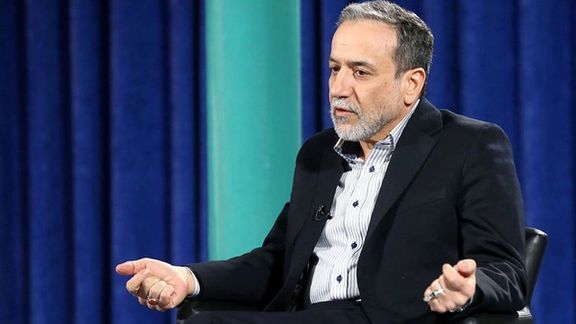
Iranian Foreign Minister Abbas Araghchi has denied that Tehran supplied ballistic missiles to Russia, pushing back against accusations as the European Union prepares to impose sanctions.

Iranian Foreign Minister Abbas Araghchi has denied that Tehran supplied ballistic missiles to Russia, pushing back against accusations as the European Union prepares to impose sanctions.
During a meeting with the European Union's foreign policy chief Josep Borrell, Iran's Foreign Minister confirmed the delivery of short-range rockets to Russia, but said Iran has not provided ballistic missiles to Russia.
In a statement posted on social media platform X, Araghchi wrote, “We have not provided ballistic missiles to Russia, and if Europe needs an excuse to cave in to Israel’s blackmail, it should find another story.”
It is not the first time that Iran has deflected attention by blaming Iran's archenemy Israel, which was targeted with a barrage of 181 ballistic missiles earlier this month.
Araghchi added, “Iran-Russia military cooperation is not new and dates back to before the Ukraine crisis. Some European countries have provided the Israeli regime with advanced weapons while participating in military operations against Iran.”
The remarks came in response to an earlier report from The Wall Street Journal, in which EU reporter Laurence Norman said that Araghchi had acknowledged, during a meeting with EU foreign policy chief Josep Borrell in New York, that Iran sent short-range missiles with a range of 250 kilometers to Russia.
Norman wrote, “Senior EU official says Araghchi acknowledged in NY that Iran had sent missiles to Russia of less than 250km range. He claimed they were not 'ballistic' missiles.”
Despite Araghchi’s denial, the European Union is pressing ahead with sanctions targeting Iranian individuals and entities connected to the missile transfers. Citing a senior EU official, Reuters reported that the sanctions are likely to be introduced as early as Monday. The sanctions are part of the EU’s first wave of punitive measures linked to Iran’s alleged missile transfers and could also impact sectors beyond military ties.
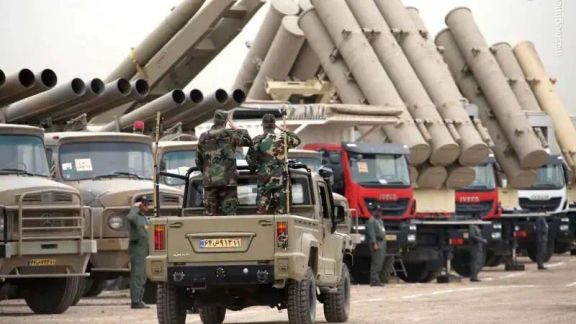
Iran has been widely criticized for its deepening military support for Russia in Ukraine, particularly its provision of drones used to target civilian infrastructure. It has also led to global sanctions on Iran.
The two nations appear to be drawing closer politically and militarily. Reflecting the ideological alignment, on Friday, Iranian President Masoud Pezeshkian and Russian President Vladimir Putin met in Turkmenistan, where Putin remarked that the countries’ “assessments of events taking place in the world are often very close.”
Last month, EU foreign policy chief Josep Borrell issued a warning to Tehran, stating that the bloc would “respond swiftly and in coordination with international partners” if Iran continued supplying weapons to Russia.
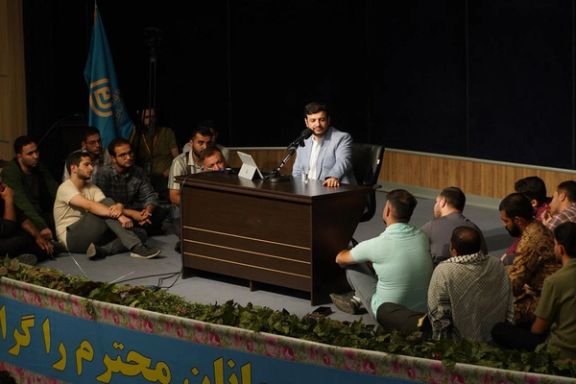
A controversial politician popular with ultra-hardliner youth has sparked social media controversy by claiming Iran’s Leader wants him to continue in his path “with determination”.
Ali-Akbar Raefipour, a prolific speaker and social media activist, claimed in a speech on Thursday that Supreme Leader Ali Khamenei had responded to a "fifteen-page letter" he sent a month ago. Raefipour’s critics quickly took to social media, accusing him of fabricating Khamenei’s support and demanding that he publish both the letter and the alleged response. They argue that Khamenei rarely responds personally to politicians, especially outside of state matters, making Raefipour’s claim implausible.
In his speech, Raefipour said he had asked Khamenei if he was displeased with him, as his critics suggested, and offered to cease his political activities if the Leader disapproved. According to Raefipour, Khamenei denied the accusation, urging him to continue his work "with determination."
In response to a journalist who accused Raefipour of falsely claiming Khamenei responded to his letter, one of his supporters argued in a tweet Friday that he would not have made such a claim at this time if he wanted to hide behind the Leader. Instead he would have sought Khamenei's support when he was accused of laundering money through his so-called ‘cultural institute’ by Parliament Speaker Mohammad-Bagher Ghalibaf’s supporters.
Raefipour is best known for his allegiance to the ultra-hardliner former nuclear negotiator Saeed Jalili whom he and his young ‘revolutionary’ followers supported in the presidential elections against other conservative candidates and Masoud Pezeshkian.
The views expressed by Raefipour, his supporters, and allies including the Paydari (Steadfastness) Party often mirror the apocalyptic religious and anti-Western political views of the controversial cleric Mohammad-Mahdi Mirbagheri that are sometimes even more extreme than Khamenei’s.
Raefipour established Jebhe-ye Sobh-e Iran (Iran Morning Front) shortly before the March parliamentary elections. His political party, which is often referred to as MASAF, formed an alliance with the Paydari and other ultra-hardliners against Ghalibaf, and the two sides fought a fierce battle on social media during the campaign.
In the snap presidential elections which followed the suspicious death of Ebrahim Raisi in an air crash in May, Raefipour and his followers focused their attacks on Ghalibaf again. The Speaker’s supporters retaliated with corruption and money laundering allegations against him and demanded that his party be banned.
Iran's ultra-hardliners were seen as the main losers when the establishment allowed Pezeshkian to run for president and win the election. Their leader Jalili has been silent after his loss, although observers expect the radicals to become active again if Pezeshkian's position weakens due to numerous intractable economic and other challenges.
Raefipour’s fall from favor was signaled by brigadier general Ebrahim Jabbari, a former commander of Khamenei’s security team, who strongly criticized Raefipour a few months ago for attacking top state officials including former President Ebrahim Raisi, Ghalibaf, and Chief Justice Gholam-Hossein Mohseni-Ejei and implied that Khamenei was unhappy with Raefipour’s conduct.
Jabbari also accused him of refusing to publicly condemn the former President Mahmoud Ahmadinejad who fell from Khamenei’s favor over a decade ago. A leaked audio file of his talk against Raefipour was widely posted on various social media platform.
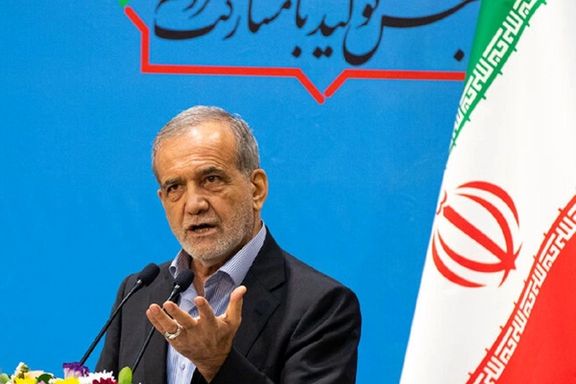
During his speech at the University of Tehran on Saturday, President Masoud Pezeshkian was repeatedly interrupted by protesters. Despite earlier promises, he avoided addressing the dismissal of students and professors involved in protests.
As Iranian media reported, one student interrupted Pezeshkian at the beginning of his speech, protesting the lack of opportunity for students to voice their opinions. “A student doesn’t disrupt the event—let me finish my speech, and we’ll see what happens next,” Pezeshkian responded, offering to leave if the protests continued. He then asked the students to appoint a representative to speak on their behalf.
The president stepped down from the podium to listen to a student protester from the Basij, a hardline paramilitary organization. The student called for Pezeshkian to participate in a December 7 revolutionary ceremony in the university. However, moments after Pezeshkian resumed his speech, the session was disrupted again, this time by a university employee, escalating the tension.
“You, who can’t maintain order, mean we still haven’t reached the understanding to follow the rules,” Pezeshkian said to the employee, criticizing his behavior. He added, “If university staff have something to say, hold a meeting for them, and we’ll talk together.”
Two years ago, during the Woman, Life, Freedom protests, Iranian universities became hubs of unrest, with students openly protesting against the government, including Supreme Leader Ali Khamenei. Pezeshkian’s speech, which was broadcast live on state television, was a reminder of the divide between the government and the student body.
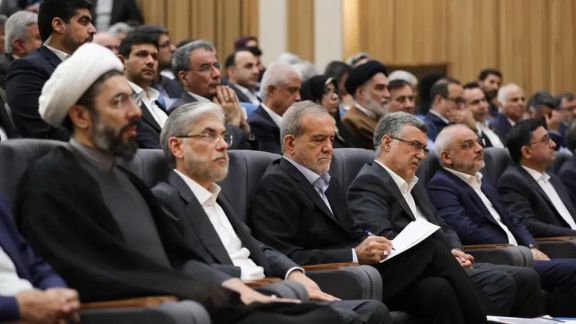
Despite the mounting frustration, Pezeshkian continued his speech, stressing, "Why should we fight? Whether left or right, religious or non-religious, bring a valid argument, and we’ll accept it.”
Notably absent from Pezeshkian’s speech was any mention of the ongoing crackdown on academic freedom. In recent weeks, the government has expelled more students for participating in protests, intensifying the scrutiny on Iran’s higher education system. While Pezeshkian previously criticized such dismissals, his silence on the matter at the University of Tehran was significant.
In an indirect response to earlier calls for reinstating expelled students during Pezeshkian campaign, Mostafa Rostami, the Supreme Leader’s representative in universities, made clear that such efforts would not be tolerated. Following his remarks, two more students were officially banned from continuing their education, reinforcing the control of security bodies over universities.
The financial challenges facing Iran’s higher education sector also loomed large. Iran’s Science Minister, Hossein Simayi Sarraf, underscored the situation during the same event, stating, “The total budget for our universities and educational centers is less than the budget for a single top university in the world.” Sarraf emphasized that the education budget has halved in foreign currency terms since 2011, warning of an academic exodus as students and professors seek better opportunities abroad.
Pezeshkian, however, focused on the need for Iranian universities to generate their own income, sidestepping Sarraf’s concerns. "Abroad, universities either receive government funding or generate their own income. If we want to solve our problems, university professors must help us address societal issues,” Pezeshkian said, suggesting that Iranian universities adopt similar financial strategies.
Ali Shirazi, an Iranian affairs expert, told Iran International that Pezeshkian’s remarks revealed a divide between him and the science minister. “When the science minister talks about the budget shortage, Pezeshkian counters by saying universities, like those abroad, must generate their own income,” Shirazi explained. “He doesn’t acknowledge the vast differences between the situation in Iran and universities in other countries.”
Iran’s university crisis is compounded by controversial policies, such as admitting members of Iraq’s Popular Mobilization Forces (PMF) into Iranian universities without entrance exams. Student activists have objected, vowing to resist the militarization of academic institutions.
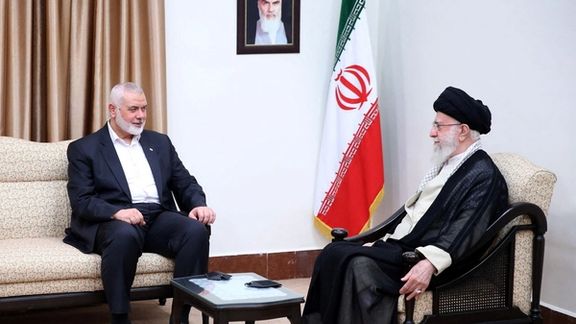
Iran had been informed about Hamas's plan to launch the October 7 attack on Israel at least since July 2023 and even welcomed it, secret documents seen by The New York Times reveal, contradicting previous claims by Iranian authorities that Tehran was not aware of the plan.
Iranian officials have repeatedly made the claim that they were not involved in the terror attack, but the government immediately on October 7 praised the invasion and ordered street celebration, with large banners erected within hours.
Documents seized by the Israeli military and verified by The New York Times show senior Hamas leader Khalil al-Hayya discussed the plan with IRGC commander Mohammed Said Izadi in July 2023.
Izadi said that Hezbollah and Iran welcomed the plan in principle, but that they needed time “to prepare the environment," the report said.
The documents, however, do not say how detailed a plan was presented by Hamas to its allies.
Back in November, Iranian officials claimed they had no warning of the October 7 invasion of Israel by its proxy Hamas, according to a report by Reuters. Three sources said at the time that “Iran's supreme leader delivered a clear message to the head of Hamas when they met in Tehran in early November … You gave us no warning of your Oct. 7 attack on Israel, and we will not enter the war on your behalf.”
Iran’s Mission to the United Nations denied the claims made in the secret documents verified by The Times. “All the planning, decision-making and directing were solely executed by Hamas’s military wing based in Gaza, any claim attempting to link it to Iran or Hezbollah — either partially or wholly — is devoid of credence and comes from fabricated documents,” the Iranian statement said.
In the attack on southern Israel, 1,200 people, mostly civilians, were massacred by Hamas fighters and a further 240 were taken hostage, in the deadliest single day for Jews since the Holocaust.
The attack prompted Israel to bombard and invade Gaza, killing tens of thousands of Palestinian civilians and militants. The Gaza war also engaged Hezbollah in a one-year exchange of fire with Israel, which culminated in the Israeli killing of Hezbollah leader Hassan Nasrallah and almost all other top commanders of the group.
The New York Times said the newly obtained documents "represent a breakthrough in understanding Hamas" and "show extensive efforts to deceive Israel about its intentions as the group laid the groundwork for a bold assault and a regional conflagration that Hamas leader Yahya Sinwar hoped would cause Israel to 'collapse'."
According to the secret documents, "Hamas initially planned to carry out the attack, which it code-named “the big project,” in the fall of 2022. But the group delayed executing the plan as it tried to persuade Iran and Hezbollah to participate."
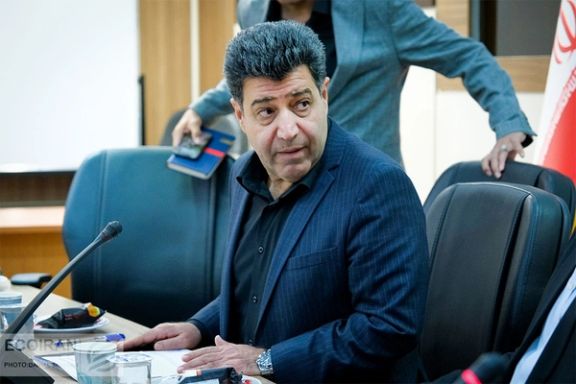
The former head of Iran’s Chamber of Commerce, recently sentenced to prison and fined, has dismissed the government's claims of free trade with Eurasia as empty rhetoric, pointing to the ongoing effects of sanctions.
Hossein Selahvarzi, in an interview with ILNA on Saturday, pointed out that “over the past two years, significant attention has been devoted to the notion of free trade with the Eurasian Union, which has frequently been used for political and promotional purposes. This has gone hand-in-hand with efforts to advocate for Iran’s membership in other international groups like BRICS and the Shanghai Cooperation Organization”.
He emphasized that “none of these efforts have translated into concrete economic gains for Iran.” He attributed this lack of progress to the continuation of international sanctions and Iran’s failure to comply with the Financial Action Task Force (FATF) requirements, which has kept the country on its blacklist.
As a result, Selahvarzi argued that agreements made with other nations are, in practice, unrealizable.
On Friday, Mohammad Ali Dehghan Dehnavi, Deputy Minister of Industry, Mines, and Trade, announced that Iran and the Eurasian Economic Union (EAEU) are in the final stages of negotiating a free trade agreement. He expressed optimism that the agreement will “facilitate and increase the volume of trade exchanges,” potentially giving Iran a much-needed economic momentum.
Selahvarzi remains skeptical, noting that the current administration rose to power on a platform of slogans, including promises to lift sanctions and remove Iran from the FATF blacklist. Despite the government’s promotion of bilateral and multilateral agreements, Selahvarzi argues that as long as sanctions persist and Iran remains non-compliant with international financial regulations, these agreements will be largely ineffective.
The FATF, an international financial watchdog, has long pressed Iran to meet global standards for combating money laundering and terrorism financing. However, Iran's refusal to comply has kept it isolated from the global financial system. Hardline factions within Iran's power structure see FATF compliance as a threat, fearing it would hinder their ability to finance proxy groups like Hezbollah and Hamas, both central to Iran’s regional strategy.
Meanwhile, the chances of lifting sanctions through negotiations with the West seem increasingly unlikely, especially as regional tensions rise. Hardliners in the government continue to advocate for a more aggressive approach, particularly regarding Iran’s nuclear program—a key factor behind the sanctions. On Saturday, MP Mohammad Manan Raeisi claimed Iran could develop nuclear weapons within six months, heightening tensions further. Just days earlier, 39 Iranian lawmakers called on the Supreme National Security Council to reassess the country’s defense doctrine, including the potential pursuit of nuclear weapons, as hostilities with Israel intensify.
Selahvarzi's longstanding criticism of the government's economic policies has consistently placed him at odds with the political establishment. His election as president of Iran's Chamber of Commerce in June last year was immediately met with pushback by hardliners and state media. Selahvarzi, known for his outspoken presence on social media, has often criticized government officials and their policies. The recent verdict against him appears to be largely based on his tweets, especially those supporting protesters and condemning authorities during the 2022 demonstrations.
One of his notable tweets reads, "Sometimes, the pain is so overwhelming that your entire being cries, except for your eyes," accompanied by hashtags referencing the teenage girls killed during the protests.
In 2022, EcoIran reported that the Tehran deputy prosecutor general issued an indictment against Selahvarzi, accusing him of insulting the founder of the Islamic Republic, Ruhollah Khomeini, and Supreme Leader Ali Khamenei. After nearly a year of conflict following his election, Selahvarzi was ultimately dismissed from his position as head of the Chamber of Commerce. In September 2023, Mizan News Agency, affiliated with Iran's judiciary, reported that the Tehran Court of Appeals sentenced him to six months in prison and imposed a fine for “spreading lies.”
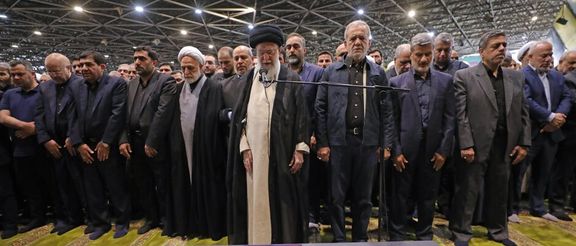
The IRGC has denied earlier remarks by one of its commanders that Iran's Supreme Leader Ali Khamenei will lead funeral prayers for Abbas Nilforoushan, the IRGC deputy commander who was killed alongside Hezbollah leader in an Israeli airstrike two weeks ago.
Iranian authorities have announced that Nilforoushan's body was found on Friday two weeks after his death. Earlier on Saturday, the IRGC commander of Isfahan announced that once his body is repatriated to Iran, it will be buried in Isfahan after funerals in Mashhad and Tehran, with Khamenei leading the funeral prayer.
However, hours later, Isfahan's IRGC information office denied this statement, saying that "The publication of any news in this regard is invalid."
Since the air strike that killed Nasrallah and other Israeli attacks, Iranian officials have issues many contradictory reports, including over the disappearance of IRGC's Quds commander Esmail Qa'ani. While some reports said he was killed in an Israeli attack in Beirut, other statements from Iran have underlined that he is alive. However, some foreign media have said that Qa'ani has been arrested on suspicions of espionage for Israel and has been subjected to interrogations.
Born in Isfahan in 1966, Nilforoushan began his military activities in the 1980s joining the Basij and later the IRGC, holding various positions including Deputy Commander of the IRGC Ground Forces for Operations.
Iranian media outlet Student News Network (SNN) described Nilforoushan as a “key figure” with extensive battlefield experience who played a crucial role in supporting the “Resistance Axis, including Hezbollah in Lebanon and Palestinian resistance groups,” helping to strengthen their capabilities against Israel.
Following the assassination of IRGC General Mohammad Reza Zahedi in an Israeli attack on the Iranian consulate in Damascus in April, Nilforoushan “assumed command of the Lebanon front,” according to the Tehran-based Fararu website.
Nilforoushan was killed in an Israeli attack on a meeting between Nasrallah, top Hezbollah members, and IRGC commanders. In a statement about Nasrallah's death, Khamenei said that the meeting was focused on designing a military plan to counter the recent wave of Israeli attacks in Lebanon.
Previous version of this news item was updated to reflect the denial by IRGC.